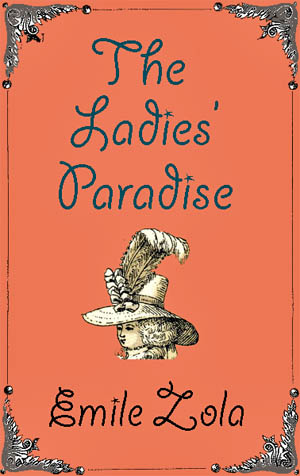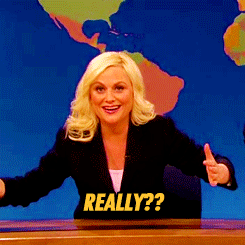 Original Publication Date: 1883
Original Publication Date: 1883Genre: Literature/fiction, romance-ish
Topics: Business, modernity, women, consumerism
Review by heidenkind:
Forced to leave her childhood home in Normandy, orphan Denise Baudu arrives in Paris with her two younger brothers, looking for work in the shop of her uncle. Unfortunately, her uncle is less than welcoming–ever since The Ladies' Paradise opened across the street, he's struggled to keep business going, and the last thing he needs is more mouths to feed. With no other option to make a living, Denise gets a job at The Ladies' Paradise and experiences the not-exactly-cheerful life a 19th century clerk. Meanwhile, The Ladies' Paradise continues to expand, threatening the established shopkeepers on the Rue de la Michodière.
It's well-known Zola based The Ladies' Paradise on Paris' real-life first department stores, the Bon Marché and the Louvre shops, and if you think retail has changed a lot in the last 132 years, all you have to do is read this book to realize you're completely wrong. The Ladies' Paradise could just as easily be Amazon.com, and its owner Octave Mouret a more dashing and romantic Jeff Bezos. All the modern rules of retail apply: selling at no profit or even a loss just to get people in the door; spreading related departments out so customers have to walk through the whole store to get the items they came in to shop for; accepting returns even when the item is obviously used; the customer is always right; advertizing everywhere; sales treated like events; customers buying stuff just because it's cheap; and the drive to grow bigger and crush the competition even when it's not necessary or practical to do so.
And if you've ever had a job in retail, you'll surely sympathize with Denise's work-related woes: the physical labor involved in walking around the store, helping customers and stocking items; the annoyance of spending a bunch of time helping a customer only to have them walk away without buying anything–indeed, you get the feeling they didn't intend on buying anything, they just wanted someone to wait on them–the social hierarchy of a store, the cliques, the lack of job security and the fear of being fired; the way female employees are treated.
Zola does an excellent job of painting a picture of a modern department store. Each chapter is themed around capturing different aspects of the store or the employees' lives. For example, one of my favorite chapters was Chapter Six, wherein Denise is fired for visiting with her worthless brother while at work. But before that happens, the employees grab lunch in the cafeteria, and I swear to god it sounded exactly like high school. Horrible, mass-produced food is served in staggered lunches, and the employees spend all their time bemoaning their meal while talking about what they'd rather be eating. Not to mention the social minefield of the lunch tables.
What I'm saying here is that Zola, no surprise, really knew his stuff. He knew how these new department stores, symbols of modernity, worked from the lowest stocker up to the management and owner, and he knew what the lives of their employees was like. The Ladies' Paradise isn't just a setting in this novel, it's the main character and an unstoppable force, rendered with almost microscopic attention to detail.
Unfortunately, all the characters in The Ladies Paradise who are, you know, actual characters and not department stores, are not developed very well at all. That especially includes the main character, Denise. She has no personality, no motivation, and she's basically just a plot element to give the reader a believable entree into The Ladies' Paradise. Her two personality features are that she's kind and innocent, of the unbelievably stupid variety. If this was a Colette novel, Denise would have hooked up with one of her numerous admirers in chapter two and let him buy things for her so that she could eat and stuff. But unfortunately The Ladies' Paradise is not a Colette novel.
Some things that simply do not make sense about Denise:
- Why doesn't she hook up with Henri Deloche? She likes him, they're adorkable together, he's devoted to her, defends her honor, and wants to marry her. Yet she refuses. NO EXPLANATION GIVEN. Literally, she's just like, "Hey, I can't explain it! I feel really bad about my inability to provide even the barest minimum of a reason, though, does that help?"
- Why does Denise continue to be so nice to her uncle WHO BASICALLY THREW HER OUT IN THE STREET after writing her inviting her to come work in his shop? I'd be like, "Va te faire enculer, I hope TLP crushes you!"
- However, given that she *does* inexplicably still treat him like a beloved family member, and that the other traditional shopkeepers like Bourras and Robineau were kind to her and took her in when Mouret and TLP unceremoniously tossed her out on her ass after making her life miserable for months and months, how can she justify her loyalty to The Ladies' Paradise? "She was secretly for the big shops." Really? I can see accepting that the big shops are going to win in the end, but you're actually rooting for them? Makes no sense WHAT.SO.EVER. Unless you're, like, a terrible person.
- In Chapter 8, Mouret convinces Denise to return to TLP, and the other employees' attitude toward her undergoes a complete one-eighty. Suddenly they all accept and respect her. Again, no explanation given.
Don't even get me started on the whole affair between Denise and Mouret. After she returns and everyone falls in love with her because she's sweet, innocent, etc., Mouret makes it clear he like-likes her and invites her to his rooms after work for "dinner." Denise is confused until someone explains to her using small words that Mouret wants to make her his mistress. She gets all upset that he would want to sleep with her without marrying her and stands him up. Okay, fine. Stick to your guns, girl.
But then... at the very end of the book, Denise is planning to leave TLP and return to her home in Normandy, which gives Mouret all the sad faces, and her friend Pauline is like, "How cruel you are, to make him suffer so! ...Do you detest him?" Which is when Denise admits, with a tortured aspect, that she doesn't detest Mouret–actually, she really truly loves him.
Pauline is like (I'm summarizing here), "Why didn't you sleep with him then? Oh, it's because you were trying to trap him into marrying you, obviously."
Denise: "Marry me! Oh! no! Oh! I assure you that I have never wished for anything of the kind! No, never has such an idea entered my head; and you know what a horror I have of all falsehood!"
Really, Denise? I mean, you initially refused to sleep with him because he didn't propose, but the thought of marriage never entered your head and you're totally not holding out now just because you want him to marry you, really? Why do you keep refusing to sleep with him, then?
Say it with me: NO EXPLANATION GIVEN.
Anyway, The Ladies' Paradise is an okay book. I think it's worth reading, it just doesn't have an actual plot or any character development to speak of. For a "realistic novel," it was pretty hard to buy into the characters' actions. Not one of Zola's better books, in my opinion.
Download The Ladies' Paradise by Emile Zola at Project Gutenberg [French–This is another annoyance, why isn't the English version on PG and Librivox?]|Project Gutenberg Australia [English]|Internet Archive [English]
And, for your enjoyment...

